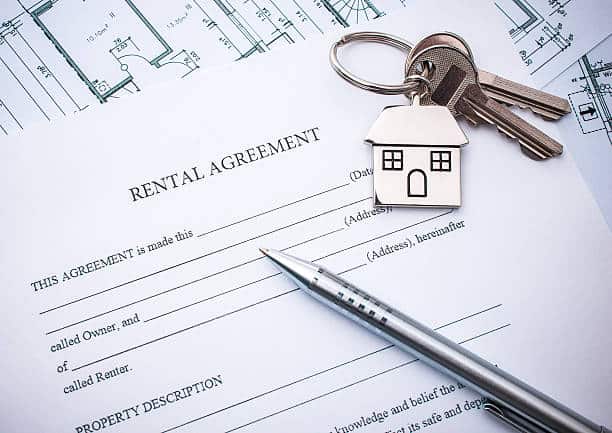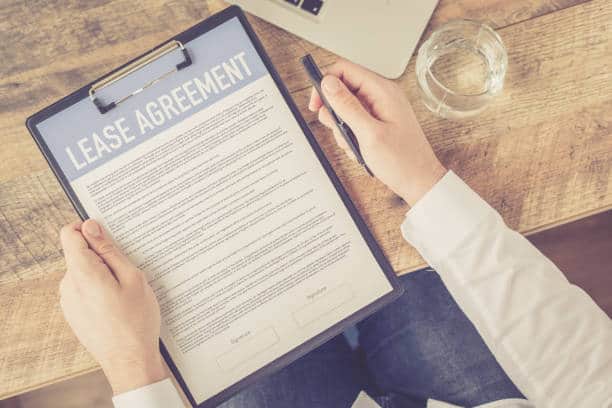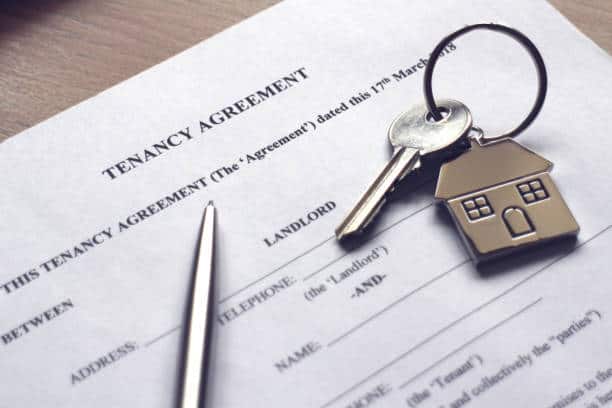We all want to be independent, but doing so sometimes is easier said than done.
Imagine this, you have finally saved enough money to get your very own first apartment and get rid of your roommate or move out of your parents’ house, and all that is left is to sign the residential lease agreement provided by your new landlord.
This agreement usually lays out your responsibilities, as well as the landlords. It also outlines the conditions of your term and the proper use of the communal shared spaces.
Apartment Lease

The idea of apartment leases is not new. Leases have been around for a long time, and you probably have one for your car or something else.
The most important thing to remember before signing on the dotted line is to fully comprehend what you are signing. You do not want to be stuck in a rental unit because you did not read the residential lease agreement carefully. Learn how to read an apartment lease here.
With that in mind, we have put together a list of everything you need to know about residential lease agreements. So let’s look at what you can anticipate when you sign one.
What is a Lease Agreement?
A residential lease agreement is a legal contract that defines the relationship between a landlord and tenant. It sets out both parties’ respective rights, obligations, and responsibilities throughout the rental term. In addition, it protects the interests of landlords and tenants alike.
What is more important is that it clearly sets out how much rent is paid and when it should be paid. It also includes provisions for late rent payments, along with the penalties for damages to property and nonpayment of rent.
All of this is why it is absolutely crucial that you need to read the document carefully and comprehend every detail.
Who Needs a Rental or Lease Agreement?
Both the landlord and tenant must sign a residential lease agreement in order to establish that both parties agree to their responsibilities, as well as how they will interact with one another.
As a renter, you should know what your landlord can and will do for you while you are under their supervision. This is because the lease conditions are legally binding and can be used in a court of law, so you must understand each provision.
What Should a Lease Agreement Include?
A standard residential lease agreement should include addresses of both the tenant and the landlord, the amount of rent due, and each party’s responsibilities. To put it another way, the agreement should address everything that impacts the two parties’ relationship. This will help lessen the likelihood of conflicts and simplify their resolution.
With that said, let’s check out some of the elements or provisions you should anticipate in a standard residential lease agreement.
Types of Lease Agreements
The type of lease you sign could affect your apartment living experience. You need to understand the type of lease you are offered by your landlord. If you are unsure about which type of lease is being offered and you are thinking you should have a lawyer review your apartment lease, visit a law firm (you can simply chat online and request their services) and hire an attorney to provide legal advice.
So, let’s check out the types of lease agreements.
Fixed Term Lease
Fixed term leases are a common type of lease in apartment communities because it guarantees your tenancy for a certain period. The most common lengths are six months, a year, or two years.
One benefit of this type of lease is that you won’t have to worry about an increase in rent price because your rate is locked for the entirety of the lease. Find out when your landlord can increase rent here.

Month-to-Month Lease
This is also another common type of lease in apartment communities. It usually renews (automatically renews) itself until one of the parties decides to end the lease, which typically requires formal notice.
Sublease Lease
This is a type of leasing that allows you to sublet your unit during your time of tenancy. Under this type of lease, you agree that you will be subletting the unit and the new tenant will be paying rent, as well as taking care of the property on your behalf. Before committing to one of these, make sure your landlord accepts subleasing, because not all do.
Length of Lease Term
A leasing term is the length of time you can rent an apartment before the agreement expires. For many people, the lease term is a crucial part of the document because if you move out before your lease is up and you don’t have a good reason, there may be penalties due to breaking your residential lease agreement. Learn how to break a lease without penalty here.
With that said, the length of the apartment lease term should be a consideration when renting a residential property. The shorter the apartment lease, the more flexibility and mobility for the tenant, but it usually comes with a higher rental rate. If you are looking to stay in your space for a longer period, then a two year lease may be the better option for you, and you can take advantage of lower rates, too.
Rent Details
One of the top items on your standard residential lease agreement is the monthly rent amount. This is obviously an important detail because it determines how much you need to pay every month. Also, you will find the security deposit that you need to pay, which is typically required prior to moving in, along with the first month’s rent.
So, before signing any agreement, make sure to compare the rent prices of different properties to ensure you are getting a fair deal. In addition, make sure you are signing what you agreed on.
Property Details
The landlord has the obligation of providing the property details to all tenants. For example, if the apartment was built before 1978, the landlord must provide a lead based paint disclosure to all new tenants in Michigan.
Utility Costs: Are Utilities Included?
The residential lease agreement will also include the utility cost. For instance, it is important to know if the water is included in the base rent or not, as an increase in water rates could result in a rent increase due to increased utility costs for the property owner. Get tips on how to keep utility bills low in an apartment here.
Learn what expenses you will be accountable for and what the landlord will cover.
Pet Policy
If you have a pet, it is important to know if there are provisions in the standard residential lease agreement, such as a pet deposit and pet rent. There may also be additional costs associated with any damage your pet may cause to the property.
To avoid any conflicts with the landlord, familiarize yourself with the apartment pet policy, especially when it comes to breed restrictions. Note that the policies might vary if you have a psychiatric service dog.
Noise Policy
Noise complaints are a common thing in many apartments. If you are someone who loves parties, you may want to take a look at this provision to understand the quiet hours within the building complex. This will keep you out of trouble with your next-door neighbors as well as the property manager. Learn how to deal with noisy apartment neighbors here.
The Obligations of Each Party
The lease will stipulate the responsibilities of you and the landlord. The cost of rent, what maintenance costs you are responsible for, and any other fees will be outlined in your rental contract.
Some examples of obligations for each party may include:
Landlord Responsibilities
- Handle major apartment repairs
- Ensuring safety of all residents
Tenant Responsibilities
- Pay rent on time
- Take care of the property
- Handle assigned repairs by the landlord
Personal and Contact Information of the Tenant
There is a section where you will be asked to give personal information, such as your contact information, driver’s license number, and bank account information, among other things. This is all typically collected during the application process, but it could also be asked for in the move-in packet.
If you are a first time apartment renter, do not be surprised if you are requested to submit all of these details. It is usually the routine policy to ensure your safety as well as the protection of other residents. All of this information is not only used to make sure that you as a tenant passes all of the screening policies in order to live in the community, but also god forbid there is an emergency of any kind during your tenancy.
Please note that all of your credit details and related documents are protected under federal law. The Fair Credit Reporting Act, for example, governs how a landlord might use your credit history to screen you.
Contact Information of the Landlord
Similarly, the landlord will provide contact information and a phone number where you can reach them. They also typically provide information on who to call if what is considered emergency maintenance in an apartment arises.
Early Termination Clause
This is a very important part that many people fail to recognize before signing their rental contract. If your job requires you to move from place to place, consider paying attention to this section.
Determine how much it will cost you to break your lease before it ends (early termination). If you are not sure where you will be in the following six months, consider a shorter term lease or a month-to-month lease agreement (periodic leases) whereby you will only have to submit a move-out request 30-days ahead of schedule.

If you are on a fixed-term lease and you move out early, you may be obligated to pay for the remaining months, even if you are not going to stay in the apartment.
Generally, if the landlord or tenant decides to terminate the lease before it expires, both must show reasonable efforts and serve a 30-day notice prior to vacancy. With that said, there are circumstances where you could break your lease without incurring any penalties, such as domestic violence, discrimination, or the failure of the landlord to provide a livable apartment condition.
Additional Fees Associated with the Rent
Establish how much it will cost you (additional rent) for a late rent payment. Late payment of rent can have a serious impact on your credit score, in addition to the late fees charged by most landlords.
Typically, most apartments have a grace period of 3-days before you are considered to be in arrears. If this occurs, you will be sent a notice by mail. The next step is an eviction notice if you do not come up with the money before the timeline stipulated in your lease.
Renter’s Insurance
Is renters insurance required in Michigan? That depends on what your landlord requires.
Almost every apartment will require that you have renters insurance before they move forward with the lease. This type of insurance covers your belongings if they happen to be destroyed or damaged by water or in the event of a fire. Make sure you check out such provisions so you can include them in your budget.
Alterations to the Rental Property
Apartment living comes with a set of rules that must be followed. Landlords often create strict guidelines on how to decorate the space and what changes can be made to the property. Violating these guidelines may lead to high costs in repairs or even eviction, so it is important to read up on the rules before making any changes. Also, you should only make alterations if the landlord agrees.
In addition, some apartments include tenant responsibility clauses in their leases that dictate what tenants are expected to repair when it comes to damages caused by themselves or their guests during occupancy.
At the end of the lease, typically the landlord will examine the apartment and establish whether the damage to the property is out of the tenant’s negligence and, thus, using the security deposit for reimbursement. Make sure you take care of the property if you want to get your security deposit back.
Can You Have a Verbal Lease Agreement?
Yes, it is possible to have a verbal agreement, but that has huge legal ramifications during a dispute.
It is tough to resolve a disagreement with verbal agreement since your comments will be used against you by the landlords. So, whether the landlord agrees to a verbal agreement or not, always seek to have a written agreement that describes your relationship with the property manager.
What is the Difference Between a Lease Agreement and a Rental Agreement?
A lease agreement is typically a long-term contract where the tenant has the right to use and occupy premises for an agreed-upon length of time or for a specific amount of time, such as 12-months. A rental agreement is a short-term contract where the tenant rents the apartment for 30-days, with an option to renew.
Depending on your circumstances, you can choose the type of terms you desire. However, it is vital to note that, in comparison to rental agreements, leasing agreements frequently include a rent discount.
Questions to Ask Before Signing a Lease Agreement
Before signing a residential lease agreement, ask as many questions as you can. If you are not sure what questions to ask, here are a few to consider asking your potential new landlord:
What does this mean?
If you read a provision and don’t understand what it means, ask the landlord to explain what it means. Landlords are always willing to interpret every phrase in the residential lease agreement so you know exactly what you are getting into before moving in.
Can I move-in before the start of the month?
What happens if you decide to move-in in the middle of the month? Will you pay the whole month’s rent, even if you only stayed for half of it? These are the types of questions you should ask your landlord.
The good news is that most landlords will agree to let you move-in for half a month and just charge you for that time. Learn what is prorated rent here.
What are the payment options?
Discuss with your landlord how you will be paying monthly rent. We have heard of tenants paying rent in cash, only to be told later that there is no record that they paid, resulting in rent arrears.
If you pay rent in cash, make sure you acquire a receipt, so you have a paper trail to back up your claim. It will be difficult to win a rent dispute in court (Michigan Law/State Law) if there is no paper trail.
Is there a grace period for paying rent?
Check with your landlord to see if there is a grace period after the due date. Sometimes circumstances arise that make it hard to fulfill your rent deadline. If the landlord agrees to provide a grace period, all the better. You will want to know how much time the landlord will allow you.
Final Thought
Dealing with paperwork is often a difficult undertaking, and you may need assistance from a law firm before signing your new lease. It is preferable to spend a few dollars and obtain the assistance you require rather than risk signing a legally binding document that will harm you in the future.









